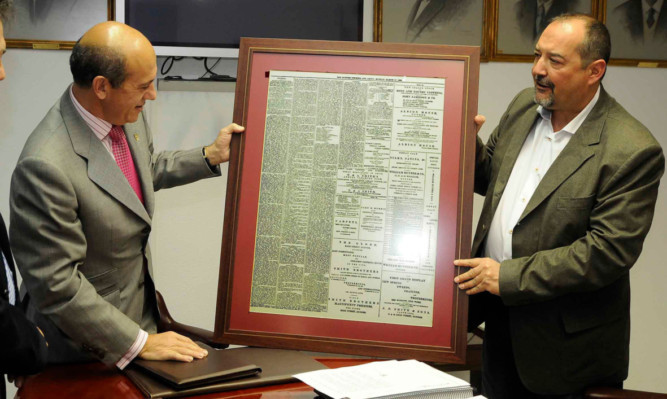A 123-year-old page of The Courier is to hang in the offices of the Spanish Football Association after it was revealed that, thanks to an article in the paper that day, Sevilla FC can officially claim to be Spain’s oldest club.
The Courier revealed in September that the discovery of the club being founded 15 years earlier than previously thought was due to the story on page four of the paper from March 17 1890, which details how a group of young British, mainly Scottish, men met in a pub in Seville on January 25 that year to celebrate Burns Night.
Along with some Spanish friends, they decided to form the country’s first official football club, and, word having reached back to Dundee, The Courier carried an article documenting the club’s act of constitution.
As a result, current members of the club say the article can be considered the founding document of Sevilla FC.
The president of Sevilla FC, Jos Mara del Nido, was presented with a copy of the page, certified by the British Newspaper Archive, by the club’s history department on January 25, 123 years after the club’s formation.
Another print of the page will be presented by the club to the Spanish FA.
Grant Millar, marketing executive of Dundee online company brightsolid, which hosts the online version of the British Newspaper Archive, was told of the presentations by Spanish researcher Javier Terenti.
Javier said: “The page in question contains a treasure for the history of Spanish football, since it is an article that describes in detail how the club was founded 15 years earlier than it was thought, thus being Spain’s oldest football club.
“The article that is extremely rich in detail shows how the club’s founding date was not a coincidence.
“Everything suggests that that Saturday 25 January, 123 years ago, a group of young British, mainly Scots, along with other young men of Spanish origin, met at one of the cafes in the city and celebrated Burns Night with the excuse of founding the first football club in Spain.
“Among the most prominent Scots was the club’s first president, EF Johnston, and first captain, Hugo MacColl, who later, upon returning to the UK, became chairman of Sunderland Burns Club.
“The discovery of the club’s Act of Constitution within an old edition of the Dundee Courier has been published not only in Spain but also in several important newspapers outside the country.”
Mr Carlos Romero, director of the club’s history department, said: “It’s a beautiful article that chronicles the adventures of those first ‘Sevillistas’, in which the following paragraph appears: ‘Some six weeks ago a few enthusiastic young residents of British origin met in one of the cafs for the purpose of considering a proposal that we should start an athletic association, the want of exercise being greatly felt by the majority of us, who are chiefly engaged in mercantile pursuits. After a deal of talk and a limited consumption of small beer, the “Club de Football de Sevilla” was duly formed and office bearers elected.”
Mr Miller added: “The reason why this important report was published in the Dundee Courier is probably due to the fact that, at that time, tonnes and tonnes of Seville oranges were loaded on steamships, travelling from Seville to Dundee for the manufacture of the city’s famous marmalade.
“However, this connection between Seville and Dundee could even go further if we take into account that two of the members of the Sevilla Football Club at that time, D Thomson and Robert Thomson, could have been related to DC Thomson, founders of the Dundee Courier.”
